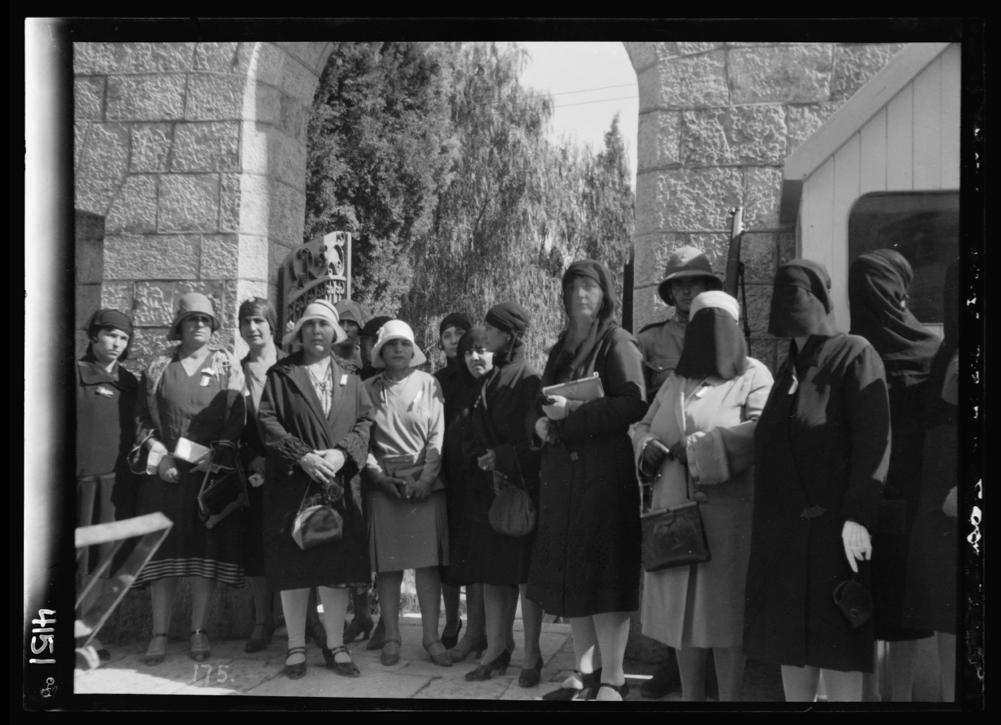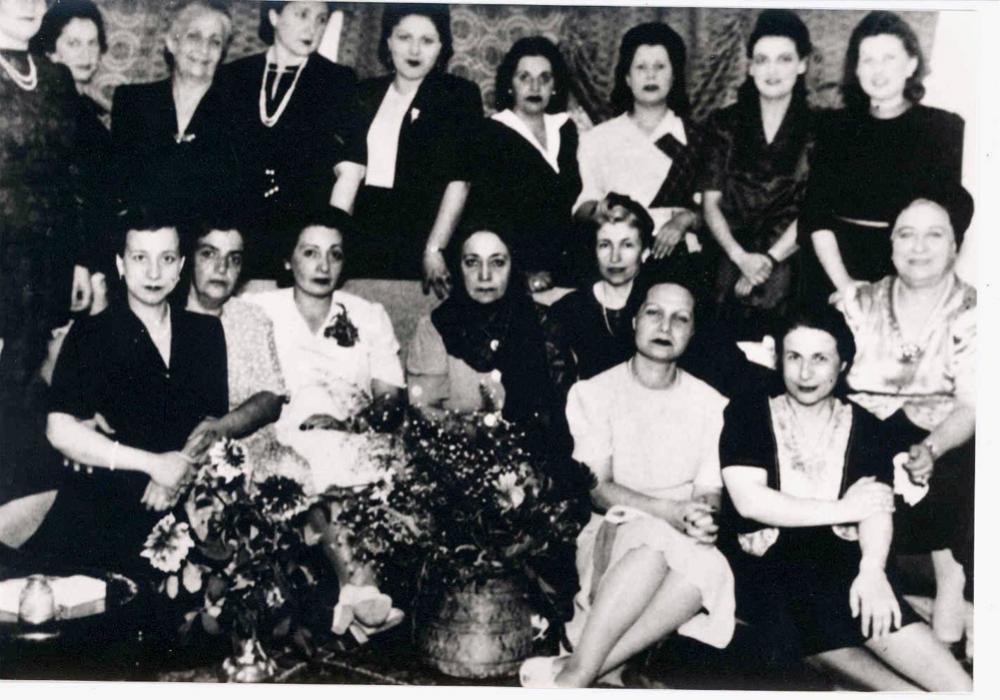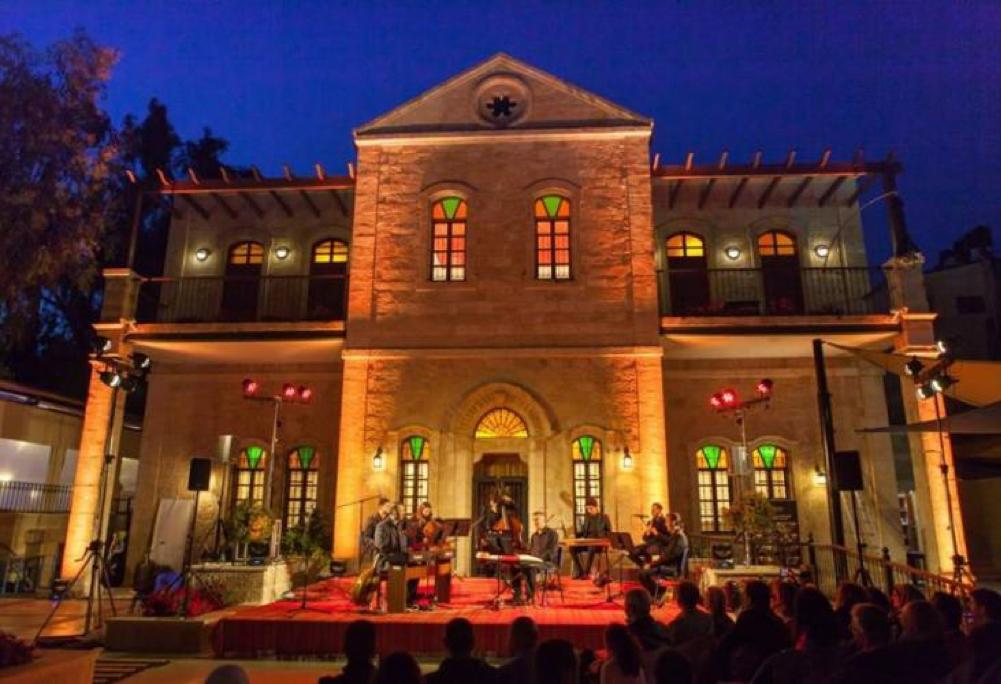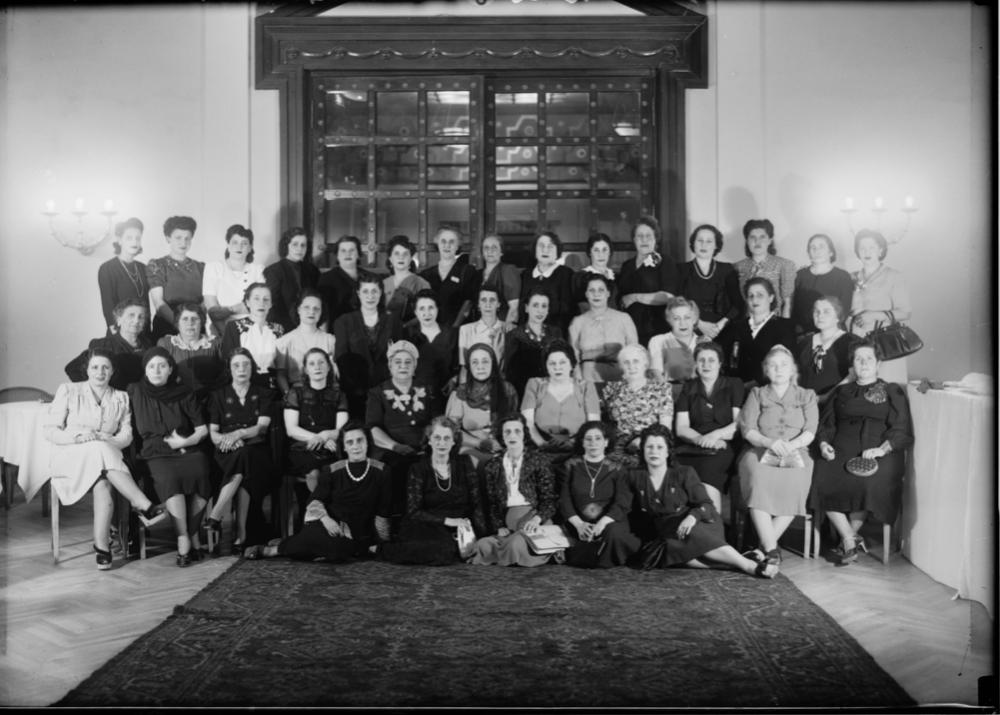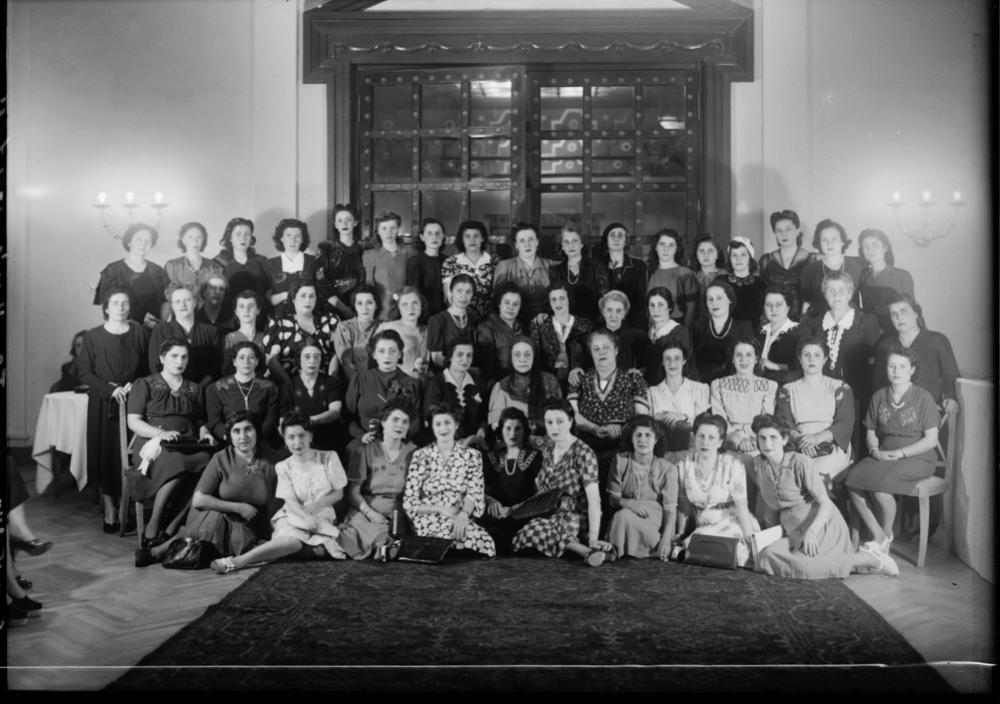Zulaykha al-Shihabi (b. 19031 in Jerusalem) was a prominent feminist Palestinian figure. She founded several women’s movements and charities aimed at advancing the status of women and girls in society.
Early Life
Al-Shihabi was born in Jerusalem to Ishaq ‘Abd al-Qadir al-Shihabi and Zaynab al-Muhtadi. She was the youngest of six children. Her family, rooted in Jerusalem since the early Ottoman period, was considered among the Jerusalemite elites during the 19th century. They held various positions within the government. Her father was deputy mayor of Jerusalem in the late Ottoman period. Another family ancestor, Sheikh Shihab al-Din Muhammad, held the Sheikh al-Aqsa position in Jerusalem.
Growing up in an upper middle-class family, al-Shihabi used her privilege and education to help others in Palestine. In particular, she worked for a more just sociopolitical status for Palestinian women. Upon learning the history of her city, she began her feminist, political career and activism at a young age.
Education
Despite being a Muslim, al-Shihabi was educated at a Catholic school, the Sisters of Zion, where she excelled. She was very aware of the city’s history. Her father was supportive of education for women, even if it meant going abroad. He also supported al-Shihabi’s political activism.
Political Activism and Involvement in Women’s Movements
Al-Shihabi was only a teenager when she started participating in and recruiting other women to join the organized protests, demonstrations, and public strikes against British policies—much of which were the culmination of the Balfour Declaration of 1917. As early as 1920, Palestinian women had mobilized to voice their concerns and publicly express their dismay by the Zionist project and its confiscation of land and properties.
Al-Shihabi had an important role in different women’s movements in Palestine, and especially in Jerusalem. Some sources estimate that by the age of 18, al-Shihabi, along with Melia Sakakini, worked toward establishing one of the oldest women’s societies in Palestine.
The repercussions and countrywide violence following the Buraq2 Revolt of August 1929 had a harrowing impact on Palestinian society. The events instilled a sense of urgency among women’s groups to organize a movement in Palestine to address the national problem.
Al-Shihabi had a pivotal role during the Buraq Revolt, as she organized a large audience to attend the trials of Palestinian rebels, to show solidarity and raise their morale. She also used to personally visit prisons and detention facilities to provide support to political detainees. These functions were part of her activities as she served as a member of the Arab Women’s Executive Committee (AWE), which was also formed in 1929.
Among the major tasks of the AWE was to convene the first Palestine Arab Women’s Congress. This objective was actualized on October 26, 1929, when the first women’s congress of its kind was held. Al-Shihabi and several hundred Palestinian women from all over the country participated in this exclusive meeting, held in Jerusalem in the home of Tarab ‘Abd al-Hadi, a Palestinian activist and feminist. According to one history, “The women who planned the congress recognized that collective, sustained, organized efforts were required for effective action, and they approached the task armed with specific strategies and tactics.”3 This meeting heralded the birth of the Arab Women’s movement and was a stepping-stone to the involvement of Palestinian women in the political arena.
Anbara Salam Khalidi, author of Memoirs of an Early Arab Feminist: The Life and Activism of Anbara Salam Khalidi, recalled this meeting thus:
What struck me most at that meeting was the total consensus achieved regarding the resolutions that were adopted, and then the astonishing frankness expressed in supporting or not supporting the names of those put forward for election to the higher committee representing Palestinian women and the solidarity with men in the political demands and the patriotic positions adopted.4
After the meeting, the women all marched to the home of the British High Commissioner for Palestine, where they sent a delegation of five women to give him a memorandum of their demands (see Box). In protest, they refused to drink the coffee that he offered because he did not make a firm commitment to meet their demands.5
AWE Resolutions
The AWE presented 12 resolutions to the High Commissioner, among them:
to undertake “a national Arab women’s awakening,” which was to be a “model for other neighboring countries”; to engage in “social, economic and literary duties” that “seek the means to advance the local Arab woman’s situation in Palestine”; to unite “the efforts of the women’s movement to establish Palestinian Arab women’s associations”; to “present protests to the higher authorities”; and to “support the national demands and efforts of the nation in Palestine to obtain its independence.”
Other resolutions dealt with trying to establish funds to buy Arab land and prevent its “leakage” to the Jews; establishing girls’ schools; linking up with women’s groups in Syria, Egypt, and Iraq; participating in the women’s conference to be held in Damascus in the spring; encouraging the national economy; and electing an executive of the congress.
Source: Ellen L. Fleischmann, “Jerusalem Arab Women’s Politicization during the British Mandate,” in Jerusalem Interrupted: Modernity and Colonial Transformation 1917–Present, ed. Lena Jayyusi (Northampton, MA: Olive Branch Press, 2015), 161, citing the newspaper Filastin, October 30, 1929.
The AWE presented 12 resolutions to the High Commissioner, among them:
Following the Congress, al-Shihabi and Sakakini cofounded the Arab Women’s Society in Jerusalem in late October 1929.
Women’s Committees at the National and Regional Levels
To a large extent, the Arab feminist movement materialized as a result of the region’s awareness about the importance of national liberation for Palestine. Arab women from the Middle East had been vocal about their support for the Palestinian nationalist cause and demonstrated publicly on this issue. During the time when al-Shihabi established the Arab Women’s Society in Jerusalem, so too did other women in the region, including Lebanon and Syria, establish women’s groups.
The aim of Arab women leaders was thus to expand a pan-Arab feminist movement while also supporting the Palestinian cause. In this regard, the Egyptian Feminist Union (EFU), and the pioneering Egyptian feminist leader Huda Sha‘rawi, sponsored the Eastern Women’s Conference for the Defense of Palestine. This conference was held in October 1938 in Cairo. Al-Shihabi was among the 27 influential women members from Palestine who got to participate in the conference, and she spoke on behalf of the Arab Women’s Society of Jerusalem.
During that conference, al-Shihabi, along with Wahida al-Khalidi,6 was elected as deputy of the Palestinian delegation to represent the Arab women’s resolution to the High Commissioner of Palestine at the Government House. The group of women again formed a delegation to the High Commissioner to present their petition against the political arrests of Palestinian men, and against all forms of suppression the British were conducting against Palestinians, in addition to opposing Zionist migration to Palestine. The delegation threatened the commissioner that they would launch massive demonstrations should he not accept their demands. Upon their return, the women held a massive demonstration. In addition to holding banners and making their voices heard, about 100 cars drove through the streets of Jerusalem protesting from the residence of the British High Commissioner.
As such, upon returning to Jerusalem, al-Shihabi demonstrated her active role on the ground. She became more eager to focus on the cross-national movement and aimed to expand the movement’s representation across different areas. Therefore, she decided on the dissolution of the Arab Women’s Society and the creation of the Palestinian Arab Women’s Union in Jerusalem. With the same objective, Jerusalem women’s associations would become integrated as branches of the Arab Women’s Association (AWA)—of which al-Shihabi had long been president.
Despite coordinating with other sections of the women’s movement throughout the country, the Arab Women’s Union became more dominant on the national scene and represented the movement abroad. The Jerusalem branch in particular excelled in its diplomatic role, as it lobbied and advocated on behalf of Palestinians nationally and internationally. This was partly due to its proximity to the seat of the government and access to information from the corridors of the Mandate regime. The AWU met with various international women’s groups and associations, including the Indian National Congress.
As for their political advocacy, the Arab Women’s Union called for the abrogation of the Balfour Declaration, the restriction of immigration according to the economic capacity of the country, and the immediate removal of Mr. Norman Bentwich, the British-appointed Attorney General of Mandatory Palestine, mainly because he was a lifelong Zionist.
The Arab women’s political efforts, as exemplified by al-Shihabi, had immense impact. Years later, the British archival materials revealed that British political representatives, including the High Commissioners, expressed their concern and fear for the power and eagerness of the Palestinian women’s movement. As a result, the High Commissioner threatened that the women would get arrested if they did not cease their activities. This move affected the shift in the political engagement of Palestinian women’s groups and restricted them to be more socially and community oriented. In fact, as a result, women mostly engaged in political activism behind closed doors and focused their efforts on community work. Clearly, life under war conditions created a dire need for such philanthropic work that the women of Palestine, including al-Shihabi, worked hard to provide.
Social Welfare
Al-Shihabi worked hard to improve the health and social welfare of women and girls in Palestine. She worked throughout the years, along with Melia Tamari, to provide free opportunities to teach young girls basic reading and writing skills. This later became integrated within the AWU’s “Dawhat al-Atfal” kindergarten in Jerusalem, which became famous for the education and healthcare it provides to children.
Among al-Shihabi’s notable achievements, through founding the AWU, was creating a first-aid field committee assigned to treat the wounded. She built a clinic to treat the low-income population by providing free medical aid, childcare services for pregnant women, and vaccinations.
Al-Shihabi’s generosity also manifested through other ways: She worked to provide shelter for orphans, for whom the union covered the educational expenses at Dar al-Aytam al-Islamiyya. In Jericho, she founded a rehabilitation facility and a home for destitute women.
Al-Shihabi looked for ways to financially sustain the AWU and the beneficiaries beyond donations. She believed in self-sustainability. Early on, the union bought several plots of land and planted grape vines or fruit trees, and these plots were presented to families of those slain in combat so they could live off the land.
Al-Shihabi also initiated programs to provide women and girls with work opportunities so that they could obtain financial independence. To that end, the union provided a variety of courses to women and girls to help them develop their skills including weaving, embroidery, and artificial flower-making.
During the 1940s, she intensified the union’s cultural activities by inviting writers and artists to give lectures on scientific, national, and cultural issues.
Contributions after the Nakba
Following the Nakba (Catastrophe) of 1948, al-Shihabi increased her political and social activities. Jerusalem remained her primary residence, but she frequently traveled to Amman. In 1959, she became the president of the Union of Charitable Societies (UCS) in the Jerusalem District. This was the first Palestinian national union, founded in Jerusalem a year earlier with the goal of contributing to building an accountable and democratic Palestinian civil society.
Al-Shihabi continued to represent Palestine at different international and national conferences. She was a prominent female member of the first Palestine National Congress, from which the Palestinian Liberation Organization (PLO) emerged on May 28, 1964.
As president of the AWU, she sought to popularize the idea of creating a general union of Palestinian women. On February 20, 1965, shortly before the Israeli occupation of East Jerusalem in 1967, she organized a general meeting of Palestinian women’s unions, aimed at bringing together representatives from Palestine and the diaspora, to discuss the creation of a broad collaborative called the General Union of Palestinian Women. This was achieved in 1965 with the aim of organizing and reinforcing the participation of Palestinian women at the political, social, and economic levels. As chairwoman of the preparatory committee, al-Shihabi oversaw the convening of the Palestinian Women’s Congress in July 1965 in Jerusalem. Between 139 and 175 participants attended and formed the General Union of Palestinian Women (GUPW) as a mass-based institution for the PLO.
After Israel occupied the West Bank, including East Jerusalem and the Gaza Strip in 1967, al-Shihabi, aged about 64, was one of the first figures to be deported to Jordan in 1968. There were several political “reasons” offered for her deportation. One was for her participation in movements demanding the return of the West Bank, including Jerusalem, to Jordanian rule. Another was for her organizing demonstrations, especially those in 1968, such as the May 15 Nakba Memorial Day demonstration, and the mid-August protest demanding the release of Palestinian women political prisoners. One more premise for her deportation was that she had cosigned petitions sent to the United Nations and various consulates calling for the end of the Israeli rule.
However, after the hard work of the then mayor of Nablus, Hamdi Kana‘an, and the late poet Fadwa Tuqan, who spread numerous petitions calling for the revocation of the deportation order,7 a number of countries and the United Nations put pressure on Israel to allow al-Shihabi to return to Jerusalem. She thus managed to return to her city and continued her work as president of the AWU. She continued to work in that capacity throughout her life.
Personal Life
Al-Shihabi never married; according to her niece, “she married the cause.”8 This was not uncommon among Jerusalemite women who were leaders of the women’s movement, possibly because “Jerusalem . . . was a society that was more tolerant of active single women.” Others who knew her described her in interviews as “outgoing and brave with a strong personality,” “outspoke,” and “always in love with her work.”9
Death
Al-Shihabi died on May 13, 1992, at age 89. Her funeral was held at al-Aqsa Mosque and many prominent national figures attended.
Films
AlGhad TV, a privately owned Jordanian media enterprise, made a short documentary about Zulaykha al-Shihabi titled “A Feminist Leader in Jerusalem.” View it here.
Additionally, Mahasen Nasser-Eldin, a Jerusalem-born Palestinian filmmaker, recently completed a documentary short about the launching of the women’s movement on October 26, 1929 and the protest that followed at the home of the British High Commissioner. While the 20-minute film, The Silent Protest: Jerusalem 1929, is not available online, more information about it is available here and here (a 2017 interview with the director about the project, when it was titled by an earlier name).
Sources
“72 Years since the Passing of Zulaykha al-Shihabi: One of the Pioneers in National, Educational, and Social Work in Palestine.” [In Arabic.] Institute for Palestine Studies. Accessed April 8, 2021.
Abdulhadi, Rabab. “The Palestinian Women’s Autonomous Movement: Emergence, Dynamics, and Challenges,” Gender and Society 12, no. 6 (Special Issue: Gender and Social Movements, Part 1, December 1998): 649-73.
AlQuds. “The Arab Women Union in Jerusalem . . . A Generous Life Journey Threatened by Lack of Funding.” [In Arabic.] November 26, 2020.
Davar. “Zulaykha Shihabi Was Granted an Approval to Return Back from Jordan to Jerusalem.” [In Hebrew.] November 14, 1968: 2.
Davar. “Hamdi Kana‘an and Fadwa Tuqan Initiated the Warranty of Zulaykha Shihabi.” [In Hebrew.] November 15, 1968: 2.
Encyclopedia.com. s.v. “Arab Women’s Association of Palestine.” Last modified August 16, 2020.
Fleischmann, Ellen L. “Jerusalem Women’s Organizations during the British Mandate, 1920s–1930s.” Palestinian Academic Society for the Study of International Affairs (PASSIA), March 1995.
Fleischmann, Ellen L. “The Emergence of the Palestinian Women's Movement, 1929–39.” Journal of Palestine Studies 29, no. 3 (Spring 2000): 16–32.
Fleischmann, Ellen L. “Jerusalem Arab Women’s Politicization during the British Mandate.” In Jerusalem Interrupted: Modernity and Colonial Transformation 1917–Present, edited by Lena Jayyusi (Northampton, MA: Olive Branch Press, 2015), 153–68.
Governorate of Jerusalem. “Zulaykha al-Shihabi (1901–1992).” Accessed April 8, 2021.
Harhash, Nadia Issam. “The Growth and Development of the Palestinian Women’s Movement in Jerusalem during the British Mandate (1920s–1940s).” Master’s thesis, Al-Quds University, 2016.
Lesch, Ann M. “Israeli Deportation of Palestinians from the West Bank and the Gaza Strip, 1967–1978.” Journal of Palestine Studies 8, no. 2 (Winter 1979): 101–31.
Maariv. “The Four Deportees to Jordan—The Heads of Inciters.” [In Hebrew.] September 9, 1968: 1, 3.
Manna, Adel. “The Palestine Elites: The City’s Scholars and Notables.” [In Arabic.] Jerusalem Quarterly 5 (Spring 2007).
Palestinian Journeys. “Zulaykha al-Shihabi.” Accessed April 8, 2021.
Sayigh, Rosemary. “Encounters with Palestinian Women under Occupation.” Journal of Palestine Studies 10, no. 4 (Summer 1981).
“Tallat Maqdisiyya—The Shihabi Family.” [In Arabic.] YouTube, March 25, 2012.
Weber, Charlotte. “Unveiling Scheherazade: Feminist Orientalism in the International Alliance of Women, 1911–1950.” Feminist Studies 27, no. 1 (Spring 2001): 125–57.
“Zulaykha al-Shihabi . . . Feminist Leader in Jerusalem.” [In Arabic.] Alghad Extra. YouTube, February 20, 2020.
Notes
Other sources claim that she was born in 1901. See “Zulaykha Shihabi (1901–1992)” [in Arabic], A Jerusalemite Personality, State of Palestine, Governate of Jerusalem.
The Wall of al-Buraq is the Arabic Islamic name for the ancient holy site known to Jews as the Western Wall (or ha-Kotel) and previously referred to in some discourses as the Wailing Wall.
Ellen L. Fleischmann, The Nation and Its “New” Women: The Palestinian Women’s Movement 1920–1948 (Berkeley: University of California Press, 2003), 117.
Anbara Salam Khalidi, Memoirs of an Early Arab Feminist: The Life and Activism of Anbara Salam Khalidi, trans. Tarif Khalidi (London: Pluto Press, 2013), Kindle Edition, Location 2369 of 3242.
Khalidi, Memoirs, Location 2380 of 3242.
Wahida al-Khalidi was one of the founders of the Arab Women’s Union in 1928 and one of the signatories on the written communications in the early 1930s to the High Commissioner. She was the wife of the then mayor of Jerusalem Hussein al-Khalidi.
Al-Shihabi’s case was the first ever revocation of the deportation order issued in Israel.
Ellen L. Fleischmann, “Jerusalem Arab Women’s Politicization during the British Mandate,” in Jerusalem Interrupted: Modernity and Colonial Transformation 1917–Present, ed. Lena Jayyusi (Northampton, MA: Olive Branch Press, 2015), 158.
Fleischmann, The Nation and Its “New” Women, 147.

